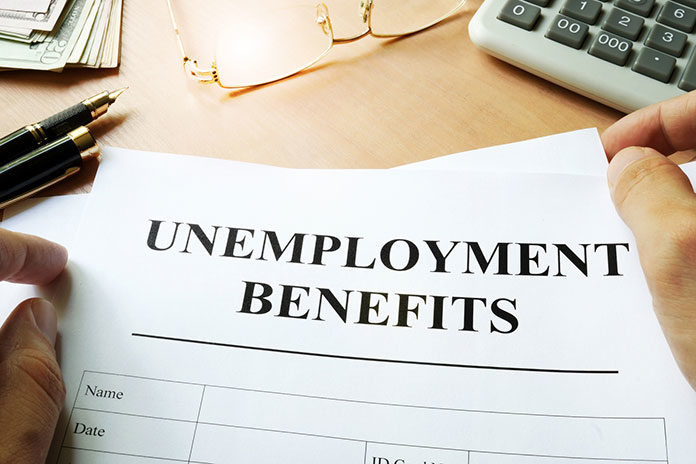
The number of Americans filing for unemployment benefits rose last week for the first time since March, showing the need for government aid isn’t waning even as the extra $600 that bolstered weekly checks during the pandemic comes to an end.
A total of 1.4 million Americans filed jobless claims for the first time as the coronavirus surges throughout many states, and reopened businesses shut their doors to slow the virus’s spread.
The uptick ended a 15-week stretch in which initial weekly claims steadily declined. In little more than four months, a staggering 52.7 million sought unemployment aid for the first time.
The economy was starting to unthaw as businesses welcomed back customers after closing in the spring to dampen the spread of COVID-19. But a surge in cases led several states, including California and Texas, to order many businesses to shut once again, slowing rehiring and fueling more layoffs.
“The labor market remains in a precarious place as COVID-19 cases surge in some parts of the country and stricter measures are adopted in response,” Oxford Economics said in an investors note.
Rachel Witt, who manages props for an opera company, was furloughed through the end of April, then again through July, as entertainment venues remained shuttered because of the coronavirus. The married mother of two, who lives in Alexandria, Virginia, hasn’t heard whether her temporary layoff will be extended, but “I have a feeling it’s going to (go) even further.”
Witt and her husband, a freelance lighting designer who lost several contracts because of the pandemic, have been getting by on the combined $1,365 in unemployment benefits they receive each week, as well as a few hundred dollars she brings home from a part-time job. Their prospects for full-time work are slim.
“The jobs just aren’t there,” she said.
Some who’d received unemployment, then returned to work, filed a new round of claims.
The latest wave of applicants may see payments significantly lower than what unemployed Americans received in recent months, as an additional $600 a week provided by the federal government is set to end this weekend.
“There is one clear takeaway from this morning’s unemployment insurance report. Not extending the weekly $600 benefit supplement would be unconscionable,” Andrew Stettner, senior fellow at the Century Foundation, said in a statement. “Families will be evicted from their homes, poverty will soar, children will go hungry, businesses will shutter and the economy will tank.”
A fight over $600
The additional money was a major boost to state benefits that average $370 a week, and many recipients said that without it, they would struggle to buy groceries or pay rent.
The Trump administration and Republican lawmakers balked at extending it, saying the extra $600 discourages a return to work since many retail, restaurant and other low-wage workers may earn more drawing unemployment.
More than two-thirds of unemployment insurance recipients make more collecting jobless benefits than they did while working, according to economists at the University of Chicago.
Senate Republicans planned to unveil a $1 trillion coronavirus relief package Thursday. Treasury Secretary Steven Mnuchin told CNBC that it would extend supplemental benefits but not at the same level, basing them instead on roughly “70% wage replacement.”
It was not clear how that income replacement would be structured. Mnuchin said there would be another round of direct payments to individuals, though he didn’t specify the size of those payments or who would receive them.
The Republican proposal was in sharp contrast to a $3 trillion bill passed by House Democrats that would extend the $600 unemployment benefit, as well as provide a second $1,200 relief check to individuals and families.
Senate Majority Leader Mitch McConnell, R-Ky., called the House bill “a nonstarter.”
The extra $600 benefit has been critical for Witt’s family, and without it, they might have to tap her retirement account to make ends meet. “We have a little bit saved,” she said. “We’ll be able to pay our rent. But if we’re unable to find other work in the next two months, we’ll have to do some serious refiguring.”
Unemployment doesn’t pay her more than she’d make working, Witt said, and having a job has value that goes beyond money.
“This inaction, this feeling stuck, like I’m in limbo, is making me crazy,” she said. “I’d prefer to be working, to have a purpose, to have a job.”
A job also means health insurance, which she has through the end of next month. “If that ends for any reason, and we have to pay for health insurance, we’re out of luck,” Witt said. “We’ll probably have to go without health insurance for a good amount of time, and we have a 4- and 7-year-old.”
More layoffs on the horizon
The number of Americans needing some kind of unemployment assistance may mount as the nation struggles to get the coronavirus pandemic under control and shuttered businesses stay closed for good.
Sixty percent of restaurants that closed because of the pandemic will not reopen, according to a quarterly bulletin released this week by Yelp, the review service.
Thursday, Ascena Retail Group, the parent company of Lane Bryant, Ann Taylor and the Justice tween brand filed for Chapter 11 bankruptcy protection and said it plans to close more than half of its roughly 2,800 stores.
“In more normal times, a significant share of people on temporary layoff could be expected to return to their previous employers, causing total unemployment to recede quickly,” Dante DeAntonio, economist at Moody’s Analytics said in a note last week.
“However, given the heightened uncertainty created by COVID-19 and the expansion in classification of temporary layoffs, that assumption is tenuous at best,” DeAntonio continued. “What is certain is that in the coming months, permanent job losses will continue to mount, as new layoffs occur and as some workers who were previously classified as temporarily laid off enter a more permanent state of unemployment.”











